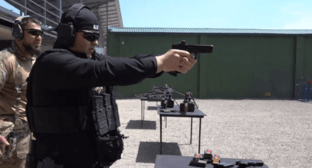02 April 2010, 18:00
Azerbaijani civil society activists state absence of independent courts in their country
Azerbaijan lacks independent judiciary; and to put it in place, constitutional and institutional reforms are required. This was the keynote idea of most of the presentations at the roundtable on April 2 at the Baku Media Centre, where proposals were discussed on changes in the judicial sphere of Azerbaijan.
The "Caucasian Knot" correspondent reports that the proposals were prepared by the "think tank" of the Institute of Peace and Democracy (IPD).
Leila Yunus, head of the IPD, said, when opening the debates, that the problem of independent courts continues to remain topical for Azerbaijan. "Unfortunately, the results of courts monitoring conducted by the IPD since 2005 give grounds to assert that Azerbaijan has no independent judiciary," said Ms Yunus. Among most scandalous examples of judicial arbitrariness, she mentioned the cases of convicted journalists and bloggers. In her opinion, one of the reasons is in imperfections of the legislation.
In his turn, lawyer Yusif Agaev, the author of the proposals prepared by the "think tank", draw attention to the collisions concerning the independence of the judicial power contained in the Constitution.
Thus, on the one hand, the Constitution postulates separation of powers and independence of the courts, and on the other hand - judges are appointed by the President (first instance judge) or are presented to him for approval by the Parliament (Appeal, Supreme and Constitutional Courts). "It gives tools to the executive power to manipulate judges," said Mr Agaev.
He also called to strengthen the principle of irremovability of judges and extension of their powers at least till the pension age, which is also one of the guarantors of the independence of the court.
"Enforcement of judgements is also a serious problem. Therefore, it would be reasonable to re-subordinate court marshals from the Ministry of Justice to the courts as such," the expert said.
Mr Agaev also highlighted the problem of absence of "glasnost" in the work of the courts, the widespread practice of "unmotivated refusals to journalists who want to cover litigations, and concealing information from them."
In his opinion, the procedure of nomination of candidates for judges by the Judicial-Legal Board; this is also not independent, since it is headed by an official from the executive power - the Minister of Justice.
Yusif Agaev has noted that "it would be more rational if the Judicial-Legal Board consisted of independent lawyers, not presented in any power branch and accountable to the parliament."
However, Muzaffar Bakhychev, head of the Research Centre "Lawful State", believes that under the present system of power in Azerbaijan, vesting the power to form the judiciary to the parliament "will not change the situation", since the legislature is not also elected on the democratic basis.
Mirvari Gakhramanly, head of the Committee of Oilmen's Rights, told about violations by judges of the law and norms of professional ethics.
In his turn, Nadir Adilov, Secretary General of the Confederation of Lawyers of Azerbaijan, believes that the courts in Azerbaijan are independent. In his opinion, the facts related to "dependence of judges" have to do "with their individual qualities." As to the judges' tenure, Mr Adilov supports the present order, when a judge is first appointed for the trial period of 5 years, and if he proves himself in the position, he will go on working in the judiciary.
He also mentioned that human rights activists often politicise trials against journalists for the sake of receiving new grants.
In reply to this, Annati Gadjibeili, head of the Association of Lawyers of Azerbaijan, said that "receiving grants is much more honourable than bribe-taking."
Lawyer Fuad Agaev suggested to introduce declaring of incomes by judges, which "would reveal their conformity to the status of executors of justice," and to narrow the gap between the minimal and maximal punishments, which could reduce the room for judge's manoeuvring and malversations.
He gave an example of such legislation drawback: Article 221 ("Organization of disorders") assumes responsibility from 3 to 11 years of imprisonment.
Aikhan Rustamzade, adviser of the Sabail District Court of Baku, who represented the courts at the roundtable, voiced his disagreement with the indiscriminate criticism of the whole judicial system. "You may disagree with decisions of the judges, but it's incorrect to blame them as illegal. Judges make decisions on behalf of the state; and only then their decisions come into force," he said.
In conclusion of the discussion, Leila Yunus, Director of the IPD, said that with account of the expressed opinions and wishes the proposals will be updated by the end of May, adopted on behalf of the number of NGOs and submitted to state bodies and international organizations.
Along with that, the IPD will continue its work of announcing symbolic lists of judges, most frequently violating human rights.
Author: Faik Medzhid Source: CK correspondent




